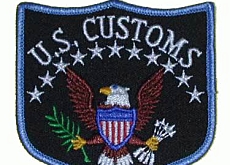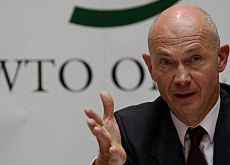“Window of opportunity” for US free-trade deal

The Swiss government is under growing pressure to start direct talks with the United States about signing a bilateral free-trade agreement.
Following several parliamentary requests, the government says it will examine whether formal moves should be made to start negotiations with US officials.
A spokesman for the economics ministry told swissinfo that the issue would be discussed “in general terms” at a special meeting of the federal government on Wednesday.
No definite decision was due at the meeting, called to discuss Swiss foreign policy, but the government was expected to discuss the issue again – with a view to deciding in principle – “before the parliamentary summer break”.
US ambassador Pamela Willeford said in a recent interview that a bilateral accord would be beneficial for both sides – a statement described by several observers as the clearest indication yet that Washington is interested in a deal.
Swiss businessmen say an accord could bring them concrete benefits including the elimination of substantial customs duties and preferential access to US markets.
And Martin Naville, CEO of the Swiss-American Chamber of Commerce, says politicians should act now to seize a “unique and limited window of opportunity”.
European focus
Naville told swissinfo: “In recent years, Switzerland’s strong focus on Europe has been detrimental to its relationship with the US. The last time a [Swiss cabinet minister] was received at the White House was in the 1980s.
“After 15 years of European focus, the moment is now right to place the economic relationship between the US and Switzerland on a solid contractual basis.”
He said the “window of opportunity” for a deal was limited, as the Trade Promotion Authority of President George Bush – under which he can send legislation to Congress on a “take-it-or-leave-it” basis – will expire on June 1, 2007.
The effective deadline is earlier – new trade initiatives will be difficult to launch after the US mid-term elections in November 2006.
Naville added: “Switzerland must make the first moves itself. Anything the Americans say can be interpreted as generic encouragement, but the ball is in the Swiss court.”
Testing the water
The US is the number two destination for Swiss exports, after the European Union, and Switzerland is the eighth-largest purchaser of US private sector services.
Switzerland is also the sixth-largest foreign direct investor in the US. Conversely, it is the fourth most important destination for US direct investment.
Jean-Daniel Gerber, head of the State Secretariat for Economic Affairs (Seco), went to the US last November for talks on issues including the possibility of a bilateral trade accord.
Bilateral free-trade agreements are in line with Bush administration policy – the US has recently negotiated a series of such accords with a number of countries including Chile, Singapore, Australia and Morocco.
Such agreements are also in line with the strategy for Swiss foreign economic policy approved by the federal government in January.
Benefits all round
The most direct benefits of an accord would be for producers of manufactured goods, who would see the elimination of customs duties currently averaging 4.1 per cent.
It could also bring direct benefits including preferential access to US markets compared to EU rivals and improvements in US treatment of direct investment.
Indirect benefits would include the opportunity for Switzerland to provide itself with a “strategic hedge against isolation” in the event of a EU-US free-trade accord.
Thomas Pletscher of economiesuisse, the Swiss Business Federation, said the main obstacle from the Swiss point of view involved US demands that Switzerland end protective measures for its agricultural sector.
He told swissinfo that a bilateral accord could result in Swiss farmers facing direct competition from cheaper imports – something that is also a key issue in the context of multilateral negotiations under the auspices of the World Trade Organization.
Bankers at risk?
A second potential obstacle involves fears that the US might insist on information exchange provisions that could affect Swiss banking secrecy.
However, Pletscher says this has “nothing to do in practice” with a free trade agreement. Other recent bilateral accords negotiated with the US have not included any such provisions.
Naville says some people see a third potential obstacle in the possibility that such a deal could prejudice Swiss relations with the EU.
However, he says: “This is complete nonsense as long as we are not ourselves in the EU. We have to deal with our main partners directly.”
Naville concludes: “This is an important chance for both countries, and it would be foolish not to negotiate at least.”
swissinfo, Chris Lewis
The US is second only to the EU as a destination for Swiss exports, while US exports to Switzerland exceed those to Russia and India combined.
The US is the major destination for Swiss foreign direct investment, and Switzerland ranks fourth for US investors abroad.
Switzerland is also a top location for European headquarters of US companies.
Business representatives say the government has a “unique opportunity” to conclude a bilateral free-trade accord with the US.
They say Switzerland has focused on European relations for the past 15 years, to the detriment of trans-Atlantic business ties.
Concrete benefits could include the elimination of customs duties on manufactured goods.

In compliance with the JTI standards
More: SWI swissinfo.ch certified by the Journalism Trust Initiative


You can find an overview of ongoing debates with our journalists here. Please join us!
If you want to start a conversation about a topic raised in this article or want to report factual errors, email us at english@swissinfo.ch.